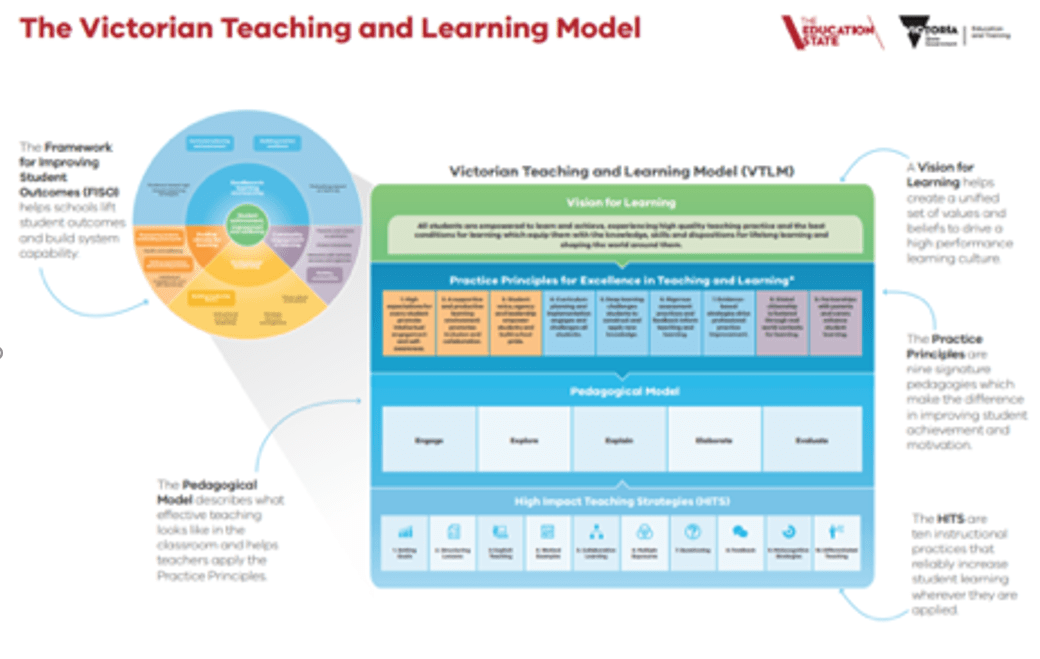
By Benjamin Pisani
EDITION #8 – How can my students & colleagues help me to be a great teacher?
Published – 21st August 2019
Benjamin Pisani is a secondary teacher who is on a secondment to the Teacher Learning Network.

The Core of teaching
In one sense, the question of ‘what is my role’ can be easily answered. The Roles and Responsibilities, Teaching Service document from the Department’s HRWeb states that:
the primary focus of the classroom teacher is on the planning, preparation and teaching of programs to achieve specific student outcomes. The classroom teacher engages in critical reflection and inquiry in order to improve knowledge and skills to effectively engage students and improve their learning. As the classroom teacher gains experience the employee’s contribution to the school program beyond the classroom increases. All classroom teachers may be required to undertake other duties in addition to their rostered teaching duties provided the responsibility is appropriate to the salary range, qualifications, training and experience of the teacher (p. 4).
Your responsibility as a teacher can be broken down into a series of key processes.
Curriculum
Firstly, it is imperative that the planning, preparation and learning in your classroom meets the relevant curriculum requirements:
- F-10, Victorian Certificate of Education (VCE)
- Victorian Certificate of Applied Learning (VCAL)
- Vocation Education and Training (VET)
These curriculum documents are published by the Victorian Curriculum Assessment Authority (VCAA). They form the basis of all the learning in Victorian schools and it is essential that all teachers are familiar with the content of the relevant curriculum document to the year level/s that they are teaching.
As a VCE teacher this means that you link assessments or learning tasks directly to the Key Knowledge or Key Skills elements of the various outcomes. As a VCAL teacher, it means mapping learning tasks to the specific learning outcomes for the various levels (Foundation/Intermediate/Senior). As a learning area teacher, it means mapping the learning tasks to the various standards. To assist with this, you can create your own mapping grids or use some that are supplied by the VCAA. A good example is the Curriculum mapping template which is a valuable resource to ensure your teaching relates directly to the curriculum documents and also works as an effective base matrix to adjust and use for other subjects that you teach.
Professional development
Professional development supports progression and development of your own pedagogical practices. It is important that teachers continually work to improve their knowledge and their understanding of current practices, studies and pedagogical approaches that will ensure that we work at the cutting edge of education. As a graduate teacher, you will be focusing on professional learning that supports your work towards full registration. You will be engaging in mentoring sessions with colleagues, observing teaching practice and implementing an inquiry.
Once you are fully registered, there are different requirements in relation to professional development. Fully registered teachers must ‘engage in at least 20 hours of professional development (PD) activities each year to renew your registration’ (Victorian Institute of Teaching, 2019). You will also be required to develop a Performance and Development Plan (PDP). A PDP will map out areas in which a teacher is seeking to improve their professional practice. The PDP will be also be influenced by the school’s Annual Implementation Plan (AIP). A PDP is divided into 3 sections, initial planning, mid-cycle and end of cycle and it is the talking point for a teacher and the reviewer to discuss progress towards achieving the professional development goals for the year. It should include the impact that this development has made in practice and the evidence to demonstrate this improvement.
To realise your PDP goals, you might attend Professional Development sessions run by your school or through external providers. PD also includes professional reading, accessing articles, journals, case studies or research that will assist you in the development of your knowledge in a particular area of interest for you or in a specific area that may assist you with the students you currently have in your care. Being part of a Professional Learning Community (PLC), working together with learning area colleagues or participating in peer observation are all fantastic ways to undertake further professional learning.
As a graduate teacher working in a government school it is recommended that you spend time completing professional reading on the key documents that have been published by the Department of Education and Training, including, the Framework for Improving Student Outcomes (FISO), The Victorian Teaching and Learning Model (VTLM), The Pedagogical Model, The Practice Principles for Excellence in Teaching and Learning, Amplify and HITS. These documents provide valuable resources to support you in developing your teaching practice.
The Victorian Teaching and Learning Model diagram below demonstrates how these documents fit together. DET provides professional development resources and sessions on the resources within the Victorian Teaching and Learning Model. These are publicised through the In Our Classrooms newsletters and via direct email.

The close contact with students and families can have significant advantages in building healthy relationships for the classroom. It can also be very rewarding to be closely involved in the community and all aspects of rural life. Many teachers, because of their organising capacity and problem-solving skills find themselves in leadership roles in rural organisations.
In rural settings it can be difficult to draw boundaries around your professional work. It is important to talk with your mentor or a school leader about how they create the space between work life and personal life.
It is also important to remember that even in social situations, you are always a teacher and you carry the responsibilities of the profession. Be very familiar with the Public Sector Code of Conduct and exercise caution in social settings where students and families are present. You are always on display, your conduct is always being judged, and you are always the ‘adult in the room’. A mistake in a regional setting is often amplified, and your reputation and your career can be damaged.
A key takeaway
Teaching is a complex and demanding role and all teachers must ensure they are aware of their professional responsibilities. It can be a steep learning curve for a graduate teacher. There is a wide range of material and organisations available to help you, but you do have an obligation to your school, your community and yourself to take the time to build your awareness of your professional responsibilities.
Discussion with your mentor
Talk with your mentor about any elements of your professional role that you are still unclear about. You might have a conversation about:
- What are the high risk moments or events in the school year?
- What are the particular expectations of this school community?
- Which teachers are held in the highest regard and why?
References
Australian Institute of Teaching and School Leadership, 2015, Professional experience: Participant roles and responsibilities, viewed 5 June 2019,
Department of Education and Training, 2017a, High Impact Teaching Strategies: Excellence in teaching and learning, viewed 5 June 2019,
https://www.education.vic.gov.au/documents/school/teachers/support/highimpactteachstrat.pdf
Department of Education and Training, 2017b, Human resources: Teacher class salaries in Victorian government schools, viewed 5 June 2019 https://www.education.vic.gov.au/hrweb/Documents/Salary-Teacher.pdf
Department of Education and Training, 2017c, Human resources: Roles and responsibilities teaching service, viewed 5 June 2019, https://www.education.vic.gov.au/hrweb/Documents/Roles_and_responsibilities-TS.pdf
Department of Education and Training, 2017d, Victorian Government Schools Agreement 2017, viewed 5 June 2019, https://www.education.vic.gov.au/hrweb/Documents/VGSA-2017.pdf
Department of Education and Training, 2018, Amplify: Empowering students through voice, agency and leadership, viewed 5 June 2019, https://www.education.vic.gov.au/Documents/school/teachers/teachingresources/practice/Amplify.pdf
Department of Education and Training, 2018, Practice principles for excellence in teaching and learning, viewed 5 June 2019, https://www.education.vic.gov.au/Documents/school/teachers/support/practiceprinciples.pdf
Department of Education and Training, 2018, The Pedagogical Model, viewed 5 June 2019,
Department of Education and Training, 2019, The Victorian Teaching and Learning Model, viewed 5 June 2019,
Victorian Institute of Teaching, 2016, The Victorian Teaching Profession Code of Conduct viewed 5 June 2019,
https://www.vit.vic.edu.au/__data/assets/pdf_file/0018/35604/Code-of-Conduct-2016.pdf
Victorian Institute of Teaching, 2019, Professional development, viewed 5 June 2019,
https://www.vit.vic.edu.au/registered-teacher/renewing-my-registration/professional-development
